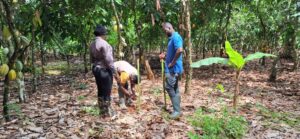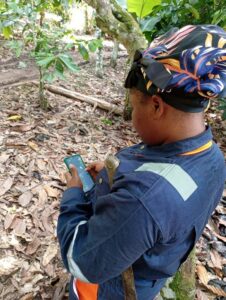What is the Labour Rights Project and why does it matter?

Workers in a Cocoa Farm, Ghana
According to the Food and Agriculture Organization (FAO), approximately 52% of Ghana’s workforce is engaged in agriculture, while in Côte d’Ivoire, about 60% of the labour force depends on this sector. Cocoa and palm oil are vital cash crops, contributing substantially to export revenues in both Countries. Despite their economic importance, agricultural workers particularly women, youth, and migrants face unsafe working conditions, exploitation, and systemic challenges that perpetuate poverty. There exists a gap in continuous, granular and current data on labour practices in these supply chains.
Global Affairs Canada funded Labour Rights Project (LRP), led by Ulula and Proforest, aims to leverage technology to track and prevent labour risks, and enable access to rights-based information and remedy for workers and farmers by collaborating with cocoa cooperatives in Ghana and Côte d’Ivoire and oil palm producers in Ghana. LRP provides the users with a digital tech platform at their fingertips to access rights-based information and safely share their feedback via surveys and grievance mechanism to advance human and labour rights compliance and impact in these sectors. It fosters partnerships among local civil society organizations, government bodies, and international businesses to develop scalable and sustainable solutions towards a collective and collaborative industry improvement.
How the LRP Tech Makes a Difference
LRP tech is powered by Ulula’s multilingual and multichannel survey and grievance management platform that allows users to anonymously take the survey or report their issues over a phone call and WhatsApp, at no cost to them. The platform is accessible from any mobile phone (feature phone/button keypad and smartphone). The users can also select the language they are most comfortable in.
- Ghana: Akan-Twi, English
- Côte d’Ivoire: Baoulé, More, Kroumen, French

LRP training and workers trying to use the IVR, Ghana.
By accommodating varying literacy levels and technological access, the platform ensures it reaches even the most remote communities.
The LRP tech’s key features include:
- Anonymity: Protecting workers’ identities to ensure their safety.
- Accessibility: Functionality on basic feature phones and smartphones.
- Near Real-Time Data: Analytics dashboard providing actionable insights for stakeholders.
This digital solution is complemented by community-led initiatives that empower workers to voice their concerns and contribute to creating fair, sustainable supply chains.
What is in the LRP Tech Toolkit
The LRP tech tools complement each other to create an effective, end-to-end system for human and labour rights risk monitoring and stakeholder engagement:
- Worker Voice Surveys: Collect actionable data by capturing farmers and workers’ perceptions on rights, risks, and systemic issues encountered in their working conditions. The questions have been co-designed based on the contextual realities of the specific region and sector. The aggregate data not only informs targeted interventions but also supports advocacy and capacity-building efforts among stakeholders.
- Grievance Management System: Enables workers to anonymously report grievances related to labour and human rights issues, such as land title disputes, health and safety violations and gender based violence such as harassment and abuse. By ensuring anonymity of the complainant, the platform fosters transparency and accountability among different stakeholders responsible for investigation and delivering remediation. The platform ensures grievances are tracked, addressed, and remediated effectively.
- Awareness raising Broadcasts: Human and labour rights risks identified from the baseline data collection have been validated with the local community members to deliver rights based information. This involves broadcasting SMS text messages as well as WhatsApp messages on the identified topics.
Women at the Core of the LRP
The LRP places significant emphasis on women’s empowerment. Women play crucial roles in agricultural production, particularly in the cocoa and oil palm sectors, yet face barriers to leadership and decision-making. To address this, the project includes:
- Gender Equity and Social Inclusion (GESI)-supported approaches for the inclusion of women and girls in program planning and implementation
- Gender-disaggregated data collection to inform targeted solutions and advocacy
- Gender-sensitive approaches for case management to respond to issues such as land title disputes, gender pay parity and harassment and abuse
Gender equality and empowerment of women and girls forms a core action area under Canada’s Feminist International Assistance Policy (FIAP) with its other action areas collectively aiming to protect and promote human rights of all vulnerable and marginalized groups and increase their participation in equal decision-making. The LRP outcomes contribute to Canada’s global effort to empower women and girls through the provision of tools and platforms for women to learn about their rights, express their opinions and concerns, and participate in the process of workplace improvement, prevention and remediation of labour rights abuses in the sectors where they work. Women’s involvement remains a core focus as the project evolves. Currently, women represent at least 42% of participants in the worker’s voice survey, highlighting progress but also underscoring the need for continued efforts to achieve greater inclusivity.
Building Strong Partnerships
The success of the LRP is underpinned by robust collaborations:
- Global Affairs Canada (GAC): As the funding body, GAC provided this funding under the “Development Impact Window”. The funding underpins Canada’s Feminist International Assistance Policy within which gender equality and empowerment of women and girls forms a core action area as well as collectively aiming to protect and promote human rights of all vulnerable and marginalized groups and increase their participation in equal decision-making
- Ulula: As the lead grantee, Ulula leverages its innovative technology to empower workers and ensure safe, anonymous reporting mechanisms.
- Proforest: A co-grantee focused on capacity-building and community engagement, ensuring cultural sensitivity and inclusivity.
- WiLDAF (Women in Law and Development in Africa): A Ghanaian partner advocating for women’s rights through legal training and empowerment.
- International Cocoa Initiative (ICI): A key partner in Côte d’Ivoire addressing child and forced labour while strengthening grievance mechanisms.
- Local Cooperatives: Six cooperatives across Ghana and Côte d’Ivoire actively participate in implementing and scaling project initiatives.
These partnerships align the project with regional and global labour standards, ensuring a sustainable framework for systemic change.
Important Milestones
Baseline Data Collection
In 2024 baseline study was conducted in Ghana’s Asunafo-Asutifi, Adum Banso regions and Côte d’Ivoire’s San Pedro regions identified key human rights challenges, shaping targeted interventions for cocoa and oil palm sectors. Insights into the specific struggles of women and migrants have guided the development of tailored approaches, especially in Côte d’Ivoire, where migrants form a significant part of the workforce.
Stakeholder Engagement and Tool Deployment
The digital tools launched in 2024 in Ghana across four cocoa cooperatives and one oil palm cooperative. Local community mobilizers continue to promote the program among the cooperative members. Since its launch, LRP has received active participation in the survey from hundreds of participants. The grievance management platform has also received close to a hundred cases on a variety of issues, including environmental concerns, land rights, labour rights, health and safety, and cases of abuse and harassment. To date, more than 50 cases have been successfully resolved and closed.

Tenant farmer wife participating in the digital tools launch in Asutifi Cocoa Landscape, Ghana.
Quote from a participant during the launch – “As a tenant farmer and wife, I often experienced unfair treatment in land arrangements and benefit sharing. But now, with my “yam” phone and LRP’s anonymous reporting system, I can confidently speak out in my native “Twi” language and get help. I feel now my voice is heard and my rights are respected. Thank you, LRP for this lifeline!”
The digital tools launch in Cote d’Ivoire is work in progress and will happen shortly.
A Vision for Continuous Impact
The LRP aims to:
- Expand digital platforms to reach more workers (especially women and girls) in both countries.
- Enhance collaboration with cooperatives and government bodies to address systemic challenges.
- Share data-driven insights through public reports and workshops.
- Scale and sustain gender-focused initiatives to ensure equitable participation and benefits for all workers.
By committing to transparency and collaboration, the LRP ensures progress is not only documented but shared to inspire further action. Stakeholders will be kept informed through digital dashboards, workshops, and public reports that detail the project’s transformative journey. As part of its sustainability strategy, the project is actively engaging with companies and brands sourcing from the region. These partnerships aim to further strengthen the project’s capacity to understand the systemic challenges and create long-term, sustainable impacts in the cocoa supply chain.
We want to hear from you.
The Labour Rights Project is not just about addressing challenges, it’s about transforming how agricultural supply chains operate. With every feedback shared via survey, every grievance reported, and every worker empowered, we move closer to a future of dignity and fairness for all.

Asunafo North Cocoa Cooperative in Ghana
Together, we can create transparent and equitable supply chains where every voice is heard. Join us on this journey to make a difference. Reach out to us.

